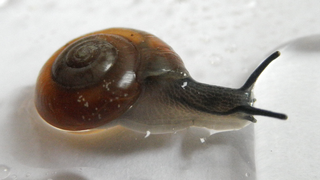
Filipendula ulmaria, commonly known as meadowsweet or mead wort, is a perennial herb in the family Rosaceae that grows in damp meadows. It is native throughout most of Europe and Western Asia. It has been introduced and naturalised in North America.

Magnolia liliiflora is a small tree native to southwest China, but cultivated for centuries elsewhere in China and also Japan. Variously known by many names, including Mulan magnolia, purple magnolia, red magnolia, lily magnolia, tulip magnolia, Jane magnolia and woody-orchid, it was first introduced to English-speaking countries from cultivated Japanese origins, and is thus also sometimes called Japanese magnolia, though it is not native to Japan. It is now also planted as an ornamental in North America and Europe, though rather less often than its popular hybrid.

Ampelopsis, commonly known as peppervine or porcelainberry, is a genus of climbing shrubs, in the grape family Vitaceae. The name is derived from the Ancient Greek: ἅμπελος (ampelos), which means "vine". The genus was named in 1803. It is disjunctly distributed in eastern Asia and eastern North America extending to Mexico. Ampelopsis is primarily found in mountainous regions in temperate zones with some species in montane forests at mid-altitudes in subtropical to tropical regions. Ampelopsis glandulosa is a popular garden plant and an invasive weed.

Magnolia denudata, the lilytree or Yulan magnolia, is native to central and eastern China. It has been cultivated in Chinese Buddhist temple gardens since 600 AD. Its flowers were regarded as a symbol of purity in the Tang Dynasty and it was planted in the grounds of the Emperor's palace. It is the official city flower of Shanghai.

The tree of life is a diagram used in various mystical traditions. It usually consists of 10 nodes symbolizing different archetypes and 22 lines connecting the nodes. The nodes are often arranged into three columns to represent that they belong to a common category.

Tyler Arboretum is a nonprofit arboretum located at 515 Painter Road, Middletown Township, Delaware County, Pennsylvania. It is open daily except for major holidays; an admission fee is charged to non-members.

Christian Knorr von Rosenroth was a German Christian Hebraist and Christian Cabalist born at Alt-Raudten in Silesia. After having completed his studies in the universities of Wittenberg and Leipzig, he traveled through the Netherlands, France, and England. At Amsterdam, he became acquainted with an Armenian prince, with the chief Rabbi, Meier Stern, Dr. John Lightfoot and Henry More. Influenced by them, and others, he studied Oriental languages, chemistry, and the cabalistic sciences. On his return, he settled at Sulzbach where he became the privy counsellor of Christian Augustus, Count Palatine of Sulzbach. He devoted himself to the study of Hebrew. Later he became a student of the Kabbalah, in which he believed to find proofs of the doctrines of Christianity.
Nemacaulis is a monotypic plant genus in the buckwheat family containing the single species Nemacaulis denudata, which is known by the common names woollyheads and cottonheads. This plant is a somewhat nondescript delicate annual herb with thin, spindly, naked stems and woolly white flowerheads. It can be found in sandy habitats in California, Arizona, and northern Mexico.

Aegopinella is a genus of small, air-breathing land snails, terrestrial pulmonate gastropod mollusks in the family Gastrodontidae, the glass snails.
Hebeloma cavipes is a species of mushroom in the family Hymenogastraceae.

Tillandsia denudata is a species of flowering plant in the Bromeliaceae family. It is native to Bolivia, Venezuela and Ecuador.
Gibbovalva urbana is a moth of the family Gracillariidae. It is known from China, India (Meghalaya) and Japan.

Acraea aurivillii, the large alciope acraea, is a butterfly in the family Nymphalidae. It is found in Sierra Leone, Liberia, Ivory Coast, Ghana, Nigeria, Cameroon, Gabon, the Republic of the Congo, the Central African Republic, the Democratic Republic of the Congo, Burundi, Uganda, Kenya, Tanzania, Zambia and Ethiopia. The habitat consists of forests.
Acaiatuca is a genus of longhorn beetles of the subfamily Lamiinae, containing the following species:
Itumbiara is a genus of longhorn beetles of the subfamily Lamiinae, containing the following species:
Acaiatuca quadricostata is a species of beetle in the family Cerambycidae. It was described by Tippmann in 1953. It is known from Brazil.
Itumbiara denudata is a species of beetle in the family Cerambycidae. It was described by Galileo and Martins in 2005. It is known from Costa Rica.
Fimbristylis denudata is a sedge of the family Cyperaceae that is native to Australia.
Briquetia is a genus of flowering plants belonging to the family Malvaceae.









